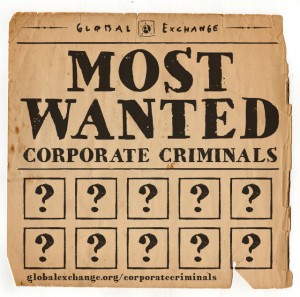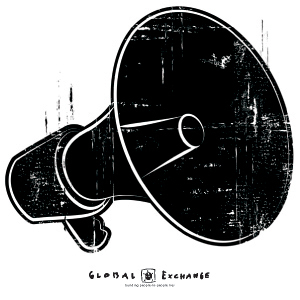The following blog post is written by Global Exchange summer intern, Linda Tenerowicz about her summer project researching corporate criminals for our Top Ten Most Wanted Corporate Criminals 2013 list. Thank you, Linda for all your help and hard work all summer!
 I’m Linda Tenerowicz, a 21-year-old college student, and shaped by global issues and social injustice.
I’m Linda Tenerowicz, a 21-year-old college student, and shaped by global issues and social injustice.
I know that sweatshops have been in operation my entire life (but increased under NAFTA); that multi-national companies and governments work together to re-write rules behind closed doors without community input and engage in shady deals to increase profit and the global economy at the expense of human rights and the environment. But I felt powerless and wondered if people could seriously change the rules and put power back in the hands of people.
I wondered how much we could fight back and force corporations to change their policies.
Well, I do now and the news is good. For the past several weeks, I have been investigating corporations that are responsible for human rights abuses and environmental disasters for Global Exchange’s Most Wanted Corporate Criminals list for 2013. The annual ‘Top Ten’ list started to raise awareness about how familiar corporations were acting internationally, connect activists with organizations fighting back and standing in solidarity with impacted communities.
It’s an impressive list; past violator, Nestle has made the list again this year – and 9 new corporations have been added to the list including Shell, Nike, Ahava, Syngenta, Blackwater, Barrick Gold, Herakles Farms, Clear Channel, and SNC Lavalin. Each new corporation comes from a different industry, revealing that no matter where consumers do business it is important to be cautious of where we spend our money.
After researching the violations, I started to look up and get in touch with non-profit organizations that specifically target these corporations and challenge corporate power. What I have realized is that corporations are reliant on public perception and these campaigns matter. Most corporations don’t want to be labeled “unethical,” “immoral,” or “criminal.” However, once a corporation cuts corners via illegal activity, cheating workers, and destroying the environment, the drive for increasing ‘growth’ will continue until profits are hurt by public image.
As a consumer, I have to make my voice matter and that starts with becoming aware. I will be the first to admit that doing background checks on those new sneakers I bought is not the highest on my list of priorities, but lately, I’m thinking twice about my purchases. As global citizens it is important to show corporations that poor practices are not going ignored. This is not a task that can be done single-handedly of course. It takes a village, a town, a city, and entire countries to denounce the abuse.
We have so many opportunities to endorse Fair Trade in our daily lives. We can purchase Fair Trade clothing, jewelry and some commodities (like chocolate, hurray!) and endorse local businesses, but our actions do not have to stop at the personal level. We can join greater movements and campaigns against unethical corporations and put more strain on them to change their ways. We can make anti-corporate activism a greater movement by educating others about economic injustice so that we may all stand against it. When we say YES to fair products we also say NO to bad corporate behavior. With numbers comes influence, and we hope that the Top Ten list will be a starting point for collective action.
This is why putting together the Top Ten Corporate Criminals list has been so fulfilling not only for myself, but for the people I am able to share this information with. Read, educate and then take action!
This summer, I had the pleasure of meeting Anu Mandavilli of the Mining Zone People’s Solidarity Group. She told us about corporate power shattering the lives of thousands of villagers in Orissa, India.
Since 2005, villagers have peacefully resisted the construction of a steel plant on their farmlands by POSCO, a Korean based steel manufacturing company. POSCO has had its sights set on areas throughout India to construct steel mines on the resource rich land. In efforts to prevent POSCO’s project, men, women, and children have physically laid on the ground to protect their lands from POSCO excavation. But villagers have been met with violent harassment, incarceration, and restricted access outside of their village to necessary medical attention and education due to POSCO’s coercion with the support of the Indian government that favors the project. Anu said that although steadfast in their struggle, the villagers of Orissa need the international community to stand in solidarity with them to condemn POSCO and defend the community’s rights.
This meeting with Anu compelled me to add POSCO on this year’s Most Wanted list as a “(dis)honorable mention”.
My hope is that you will utilize the entire list as an educational tool that will cause you to think twice before endorsing certain companies. I hope that the struggle of the Ogoni people of Nigeria come to mind when you pass a by Shell gas station, that when you see Ahava cosmetics on shelves you pass them up, taking a stand with Palestinian refugees and that the obsessive advertising by Nike to flog overpriced apparel evokes the plight of sweatshop laborers in your thoughts.
 Only then can we truly be in solidarity with the frontline communities. We need to ask ourselves where our commodities and luxuries come from. We have the ability to be ethical consumers and ensure that our goods don’t come at the price of other’s human rights and neglect of the environment.
Only then can we truly be in solidarity with the frontline communities. We need to ask ourselves where our commodities and luxuries come from. We have the ability to be ethical consumers and ensure that our goods don’t come at the price of other’s human rights and neglect of the environment.
TAKE ACTION:
- Share the list with family, friends, and colleagues to learn about corporate abuse and ways in which you can get involved in combatting the injustice.
- Join our friends at Corporate Accountability International, and add the worst abuser to the Corporate Hall of Shame.
